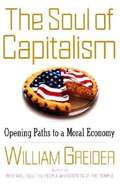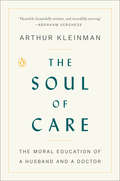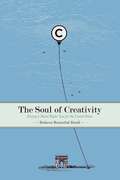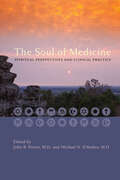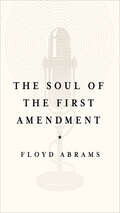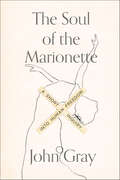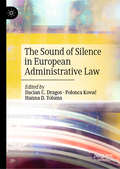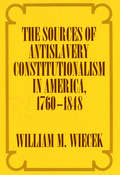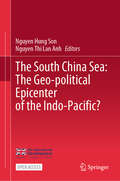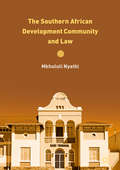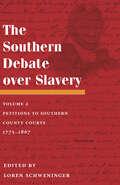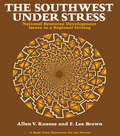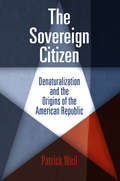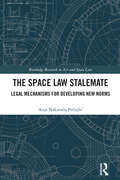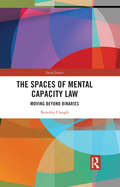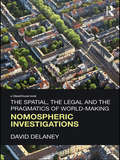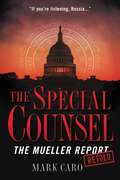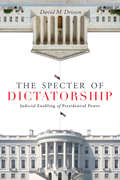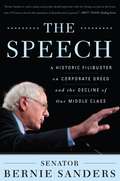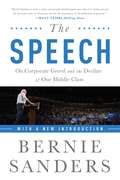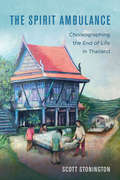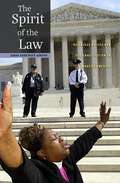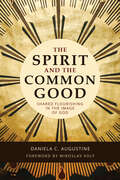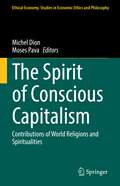- Table View
- List View
The Soul of Capitalism: Opening Paths to a Moral Economy
by William GreiderGreider examines how the greatest wealth-creation engine in the history of the world is failing most of us, why it must be changed, and how intrepid pioneers are beginning to transform it.
The Soul of Care: The Moral Education of a Husband and a Doctor
by Arthur KleinmanA moving memoir and an extraordinary love story that shows how an expert physician became a family caregiver and learned why care is so central to all our lives and yet is at risk in today's world.When Dr. Arthur Kleinman, an eminent Harvard psychiatrist and social anthropologist, began caring for his wife, Joan, after she was diagnosed with early-onset Alzheimer's disease, he found just how far the act of caregiving extended beyond the boundaries of medicine. In The Soul of Care: The Moral Education of a Husband and a Doctor, Kleinman delivers a deeply humane and inspiring story of his life in medicine and his marriage to Joan, and he describes the practical, emotional and moral aspects of caretaking. He also writes about the problems our society faces as medical technology advances and the cost of health care soars but caring for patients no longer seems important.Caregiving is long, hard, unglamorous work--at moments joyous, more often tedious, sometimes agonizing, but it is always rich in meaning. In the face of our current political indifference and the challenge to the health care system, he emphasizes how we must ask uncomfortable questions of ourselves, and of our doctors. To give care, to be "present" for someone who needs us, and to feel and show kindness are deep emotional and moral experiences, enactments of our core values. The practice of caregiving teaches us what is most important in life, and reveals the very heart of what it is to be human.
The Soul of Creativity
by Roberta Rosenthal KwallIn the United States, human creativity is historically understood to be motivated by economic concerns. However, this perspective fails to account for the reality that human creativity is also often the result of internal motivations having nothing to do with money. This book addresses what motivates human creativity and how the law governing authors' rights should be shaped in response to these motivations. On a practical level, it illustrates how integrating a fuller appreciation of the inspirational dimension of the creative process will allow us to think more expansively about legal protections for authors. Many types of creators currently lack the legal ability to compel attribution for their work, to prevent misattribution, and to safeguard their work from unwanted modifications. Drawing from a number of diverse sources, including literary, philosophical, and religious works, this book offers real solutions for crafting legal measures that facilitate an author's ability to safeguard his or her work without entirely sacrificing the intellectual property policies in practice in the United States today.
The Soul of Medicine: Spiritual Perspectives and Clinical Practice
by John R. Peteet Michael N. D’AmbraTo what extent should spiritual information be part of a patient’s medical assessment? How should physicians respond when patients refuse life-saving care on religious grounds? Should doctors pray with their patients? Questions such as these raise deeper ones about the goals of medicine and the nature of healing. In a set of engaging and candid essays, The Soul of Medicine explores the role and influence of spirituality in clinical practice, professionalism, and medical education.The contributors to this volume approach this topic from their own spiritual perspectives—Jewish, Christian, Muslim, Buddhist, Hindu, New Age / Eclectic, secular, Jehovah’s Witnesses, and Christian Scientist. Their thought-provoking essays provide rich insights not only into the needs of patients with various world views but also into how spirituality influences the practice of medicine.When their own spiritual issues arise in medical practice, physicians rely on their professionalism, ethics, and education. To better understand how various world views are incorporated into clinical work, doctors must ask themselves—as these contributors have—a series of important questions: What insights about life and healing does your faith provide? How does your faith challenge or reinforce contemporary medicine? How do you assess and address spirituality in clinical practice? How do your own beliefs influence your interactions with patients?The Soul of Medicine encourages medical students and practitioners to recognize the spiritual dimensions of medicine, to consider how these dimensions inform their own education and practice, and to be compassionate about their patients’—and their own—religious beliefs.
The Soul of the First Amendment: Why Freedom of Speech Matters
by Floyd AbramsThe nation&’s most celebrated First Amendment lawyer&“explores the American right to free speech in this thoughtful and concise volume&” (Publishers Weekly). The right of Americans to voice their beliefs without government approval or oversight is protected under what may well be the most honored and least understood addendum to the US Constitution—the First Amendment. Floyd Abrams, a noted lawyer and award-winning legal scholar specializing in First Amendment issues, examines the degree to which American law protects free speech more often, more intensely, and more controversially than is the case anywhere else in the world, including democratic nations such as Canada and England. In this lively, powerful, and provocative work, the author addresses legal issues from the adoption of the Bill of Rights through recent cases such as Citizens United. He also examines the repeated conflicts between claims of free speech and those of national security occasioned by the publication of classified material such as was contained in the Pentagon Papers and was made public by WikiLeaks and Edward Snowden. &“Abrams&’s engaging and plain-spoken reflections will be of interest to those already steeped in constitutional law as well as young readers curious about the nation&’s founding ideals . . . For Abrams, one inescapable truth applies across the history of First Amendment disputes. To allow the government to determine whose speech can be regulated . . . is, as [his] fascinating history shows, literally to play with fire.&”—The Wall Street Journal &“He dives into historic and contemporary controversies that test our adherence to these principles, noting, &‘Speech is sometimes ugly, outrageous, even dangerous.&’&”—The Washington Post
The Soul of the Marionette: A Short Inquiry into Human Freedom
by John GrayCompared with that of humans, the life of the marionette looks more like an enviable state of freedomIn his brilliantly enjoyable and freewheeling new book, John Gray draws together the religious, philosophic, and fantastical traditions that question the very idea of human freedom. We flatter ourselves about the nature of free will and yet the most enormous forces—logical, physical, metaphysical—constrain our every action. Many writers and intellectuals have always understood this, but instead of embracing our condition we battle against it, with everyone from world conquerors to modern scientists dreaming of a "human dominion" almost comically at odds with our true state. Filled with wonderful examples and drawing on the widest possible reading (from the Gnostics to Philip K. Dick), The Soul of the Marionette is a stimulating and engaging meditation on everything from cybernetics to the fairground marionettes of the title.
The Sound of Silence in European Administrative Law
by Dacian C. Dragos Polonca Kovač Hanna D. TolsmaThis book examines administrative silence in a comparative manner in the EU law and 13 jurisdictions from Europe. Administrative silence is an issue that lies at the intersection of legal and managerial aspects of public administration, a concept that is both reflecting and testing the principles of legal certainty, legality, good administration, legitimate expectations, and effectiveness. Inactivity or excessive length of proceedings appears to be of interest for comparisons, particularly in the context of the recent attempts to develop European convergence models. The book offers in-depth insights into legal regulation, theory, case law and practice regarding positive and negative legal fictions in the selected European jurisdictions.
The Sources of Anti-Slavery Constitutionalism in America, 1760-1848
by William M. WiecekThis ambitious book examines the constitutional and legal doctrines of the antislavery movement from the eve of the American Revolution to the Wilmot Proviso and the 1848 national elections. Relating political activity to constitutional thought, William M. Wiecek surveys the antislavery societies, the ideas of their individual members, and the actions of those opposed to slavery and its expansion into the territories. He shows that the idea of constitutionalism has popular origins and was not the exclusive creation of a caste of lawyers. In offering a sophisticated examination of both sides of the argument about slavery, he not only discusses court cases and statutes, but also considers a broad range of "extrajudicial" thought—political speeches and pamphlets, legislative debates and arguments.
The Sources of Normativity
by Christine M. KorsgaardEthical concepts are, or purport to be, normative. They make claims on us: they command, oblige, recommend, or guide. Or at least when we invoke them, we make claims on one another; but where does their authority over us - or ours over one another - come from? Christine Korsgaard identifies four accounts of the source of normativity that have been advocated by modern moral philosophers: voluntarism, realism, reflective endorsement, and the appeal to autonomy. She traces their history, showing how each developed in response to the prior one and comparing their early versions with those on the contemporary philosophical scene. Kant's theory that normativity springs from our own autonomy emerges as a synthesis of the other three, and Korsgaard concludes with her own version of the Kantian account. Her discussion is followed by commentary from G. A. Cohen, Raymond Geuss, Thomas Nagel, and Bernard Williams, and a reply by Korsgaard.
The South China Sea: The Geo-political Epicenter of the Indo-Pacific?
by Nguyen Hung Son Nguyen Thi Lan AnhThis open access book focuses on the geopolitical competition in the South China Sea, an area with highly concentrated choke points in the Indo-Pacific, presenting ideas and recommendations to manage this competition and foster cooperation to maintain a peaceful and stable environment and promote sustainable governance of the South China Sea and of the Indo-Pacific in a broader sense. The increasingly complex geopolitics of the Indo-Pacific has made the South China Sea the epicenter of strategic competition between the great powers, with a rising China on the one hand and the United States, its allies, and partners on the other. In this strategic chessboard, the South China Sea is a test of resilience of the rules-based international order, such as versus grey zone operations, as well as disruptive technological developments in both traditional and non-traditional domains. The book incorporates foreign policy analysis methods to analyze and forecast key players' goals, intentions, and behaviors within the competitive strategic environment of the South China Sea. The success or failure of managing major power competition in the South China Sea, one of the hot spots of the Indo-Pacific region, will determine the future structure of international relations. In addition, as a dynamically developing region of the world, promoting collaborative ideas, particularly in areas related to conflict management is essential for maintaining a peaceful and stable environment, restoring economic growth, and progressing toward a sustainable future. This book is of interest to politicians, policy-makers, experts, scholars, researchers, and other readers who are interested in how regional issues can shape the global order.
The Southern African Development Community and Law
by Mkhululi NyathiThis book analyses whether the design of the institutions of Southern African Development Community (SADC) reflects the community’s treaty objectives and principles of democracy and the rule of law. The author provides a detailed analysis of the policy making and oversight institutions of SADC. Additionally, the project looks at institutional and legal frameworks of similar organisations (the East African Community, the Economic Community of West African States and the European Union) for comparative purposes. This work is written largely from a legal perspective, specifically international institutional law; however, it carries cross-disciplinary themes, including governance, and especially the subject of public policy making at the international level.
The Southern Debate over Slavery: Volume 2: Petitions to Southern County Courts, 1775-1867
by Loren SchweningerAn incomparably rich source of period information, the second volume of The Southern Debate over Slavery offers a representative and extraordinary sampling of the thousands of petitions about issues of race and slavery that southerners submitted to county courts between the American Revolution and Civil War. These petitions, filed by slaveholders and nonslaveholders, slaves and free blacks, women and men, abolitionists and staunch defenders of slavery, constitute a uniquely important primary source. The collection records with great immediacy and minute detail the dynamics and legal restrictions that shaped southern society.
The Southwest Under Stress: National Resource Development Issues in a Regional Setting
by Allen V. Kneese F. Lee BrownSouthwest Under Stress examines the development-environment conflict in the four contiguous states of Arizona, Utah, Colorado, and New Mexico. It emphasizes three issues with implications that extend far beyond the Southwest: water---its quantity, quality, and allocation; environment---how and to what extent it should be preserved; and the future of Native American and other poverty-stricken peoples. Energy comes in for special attention because the Southwest is a principal repository of fossil and nuclear fuels. This book serves as a guide for public policy in the region, and many of the policy alternatives set out are aimed at state and local governments. Alleviating poverty, improving the lot of Native Americans, and formulating workable water, environmental, and natural resources development policies are all of special concern to the region, but the federal government has asserted a dominant role in may of these areas. The book discusses ways in which the federal role may change to improve both federal policy itself and cooperation with other levels of government.
The Sovereign Citizen
by Patrick WeilPresent-day Americans feel secure in their citizenship: they are free to speak up for any cause, oppose their government, marry a person of any background, and live where they choose--at home or abroad. Denaturalization and denationalization are more often associated with twentieth-century authoritarian regimes. But there was a time when American-born and naturalized foreign-born individuals in the United States could be deprived of their citizenship and its associated rights. Patrick Weil examines the twentieth-century legal procedures, causes, and enforcement of denaturalization to illuminate an important but neglected dimension of Americans' understanding of sovereignty and federal authority: a citizen is defined, in part, by the parameters that could be used to revoke that same citizenship.The Sovereign Citizen begins with the Naturalization Act of 1906, which was intended to prevent realization of citizenship through fraudulent or illegal means. Denaturalization--a process provided for by one clause of the act--became the main instrument for the transfer of naturalization authority from states and local courts to the federal government. Alongside the federalization of naturalization, a conditionality of citizenship emerged: for the first half of the twentieth century, naturalized individuals could be stripped of their citizenship not only for fraud but also for affiliations with activities or organizations that were perceived as un-American. (Emma Goldman's case was the first and perhaps best-known denaturalization on political grounds, in 1909.) By midcentury the Supreme Court was fiercely debating cases and challenged the constitutionality of denaturalization and denationalization. This internal battle lasted almost thirty years. The Warren Court's eventual decision to uphold the sovereignty of the citizen--not the state--secures our national order to this day. Weil's account of this transformation, and the political battles fought by its advocates and critics, reshapes our understanding of American citizenship.
The Space Law Stalemate: Legal Mechanisms for Developing New Norms (Routledge Research in Air and Space Law)
by Anja Nakarada PečujlićThe governing international space law regime has been locked in a norm-creation stalemate for over 40 years. This stalemate endangers the preservation of established, guiding legal principles, as well as the sustainability of the parts of outer space that humans utilize. The discrepancy between norm creation, technological advancement, and the ecosystem of novel actors could generate serious consequences for future space activities and the nature of international relations. Besides the return of old rivalries in a New Cold War, new activities and actors emerging amidst a legal void emphasizes the risks of the stalemate: unstable peace, fragile cooperation, uneven technological development, and uncertain eco-sustainability. The prolonged legal stalemate cannot be treated simply as an academic question, for it has broader political and economic implications of growing strategic relevance. Unresolved issues in international space law could threaten the survival of space as a global common, thus it is essential that the ability of the norm-creation mechanism of UN COPUOS is equipped to address the ongoing changes and provide for adequate global governance. This book evaluates the current legal state and sheds light on potential future prospects, offering an overview of the political context within which it developed, providing an assessment of the selected successful examples in international law, and analyzing lessons learned. It makes recommendations for how the UN COPUOS legal apparatus should be modified in order to ensure that future space activities are possible beyond anarchy, greed, and ecological irresponsibility, and to ensure that the principle of the peaceful uses of outer space remains the governing norm.
The Spaces of Mental Capacity Law: Moving Beyond Binaries (Social Justice)
by Beverley CloughThis book explores the conceptual spaces and socio-legal context which mental capacity laws inhabit. It will be seen that these norms are created and reproduced through the binaries that pervade mental capacity laws in liberal legal jurisdictions- such as capacity/incapacity; autonomy/paternalism; empowerment/protection; carer/cared-for; disabled/non-disabled; public/private. Whilst on one level the book demonstrates the pervasive reach of laws questioning individuals mental capacity, within and beyond the medical context which it is most commonly associated with, at a deeper and perhaps more important level it challenges the underlying norms and assumptions underpinning the very idea of mental capacity, and reflects outwards on the transformative potential of these realisations for other areas of law. In doing so, whilst the book offers lessons for mental capacity law scholarship in terms of reform efforts at both domestic and internationals levels, it also offers ways to develop our understandings of a range of linked legal, policy and theoretical concepts. In so doing, it offers new critical vantage points for both legal critique and conceptual change beyond mental capacity law. The book will be of interest to researchers in mental capacity law, disability law and socio-legal studies as well as critical geographers and disability studies scholars.
The Spatial, the Legal and the Pragmatics of World-Making: Nomospheric Investigations
by David DelaneyCritical legal geography is practised by an increasing number of scholars in various disciplines, but it has not had the benefit of an overarching theoretical framework that might overcome its currently rather ad hoc character. The Spatial, the Legal and the Pragmatics of World-Making remedies this situation. Presenting a balanced convergence of contemporary socio-legal and critical geographic scholarship, David Delaney offers a ground-breaking contribution to the fast growing field of legal geography. Drawing on strands of critical social studies that inform both of these areas, this book has three primary components. First, it introduces a framework of interpretation and analysis centred on the productive neologisms ‘nomosphere’ and ‘nomoscapes’. Nomosphere refers to the cultural-material environs that are constituted by the reciprocal materialization of ‘the legal’ and the legal signification of the ‘socio-spatial'. Nomoscapes are the spatio-legal expression and the socio-material realization of ideologies, values, pervasive power orders and social projects. They are extensive ensembles of legal spaces within and through which lives are lived and, here, these neologisms are related to the more familiar notions of governmentality and performativity. Second, these neologisms are explored and applied through a series of illustrations and extensive case studies. Demonstrating their utility for scholars and students in relevant disciplines, these ‘empirical’ studies concern: the public and the private; property and land tenure; governance; the domestic and the international; and legal-spatial confinements and containments. Third, these studies contribute to an ongoing theorization of the experiential, situated pragmatics of ‘world-making'. The role of nomospheric projects and counter-projects, techniques and operations is therefore emphasized. Much of what is experientially significant about how the world is as it is and what it’s like to be in the world directly implicates the dynamic interplay of space, law, meaning and power. The Spatial, the Legal and the Pragmatics of World-Making provides the interpretive resources necessary for discerning and understanding the practices and projects involved in this interplay.
The Special Counsel: The Mueller Report Retold
by Mark Caro"This is the end of my presidency. I'm fucked." -President Donald TrumpImagine Special Counsel Robert Mueller got so frustrated with the U.S. attorney general that, instead of letting the Report on the Investigation into Russian Interference in the 2016 Presidential Election speak for itself, he allowed the full narrative of corruption, high crimes, and cover-ups to be revealed...With more than 350,000 copies sold, the Report on the Investigation into Russian Interference in the 2016 Election has taken its place as the defining document of the Trump administration. Replete with some of the most infamous characters and outlandish schemes in modern American history, the underlying evidence in the Special Counsel's written testimony could have been plucked from the script of a blockbuster movie. But at 400-plus pages of bewildering redactions and impenetrable legal analysis, the text itself is so dense that even our elected officials have admitted to leaving the report unread. Now, stripped of legalese while still faithful to fact, The Special Counsel tells the story of what really happened in a compulsively readable-yet comprehensive-narrative. Whisking readers from Manhattan's Trump Tower to the rural towns of Pennsylvania and the frosty streets of St. Petersburg, this book brings to vivid life the people, places, and politics that have shaped our post-2016 lives. One thing is bone-chillingly clear: our democracy is under attack and only an informed American public can save it. The Special Counsel is as necessary as it is thrilling.
The Specter of Dictatorship: Judicial Enabling of Presidential Power (Stanford Studies in Law and Politics)
by David M. DriesenReveals how the U.S. Supreme Court's presidentialism threatens our democracy and what to do about it. Donald Trump's presidency made many Americans wonder whether our system of checks and balances would prove robust enough to withstand an onslaught from a despotic chief executive. In The Specter of Dictatorship, David Driesen analyzes the chief executive's role in the democratic decline of Hungary, Poland, and Turkey and argues that an insufficiently constrained presidency is one of the most important systemic threats to democracy. Driesen urges the U.S. to learn from the mistakes of these failing democracies. Their experiences suggest, Driesen shows, that the Court must eschew its reliance on and expansion of the "unitary executive theory" recently endorsed by the Court and apply a less deferential approach to presidential authority, invoked to protect national security and combat emergencies, than it has in recent years. Ultimately, Driesen argues that concern about loss of democracy should play a major role in the Court's jurisprudence, because loss of democracy can prove irreversible. As autocracy spreads throughout the world, maintaining our democracy has become an urgent matter.
The Speech
by Bernie SandersIn the wake of President Obama's deal with congressional Republicans to preserve Bush-era tax cuts--tax cuts that gave colossal breaks to the wealthiest Americans--Senator Bernie Sanders, the independent senator from Vermont, publicly denounced the deal as an "absolute disaster" and decided to do something about it. On Friday, December 10, 2010, Senator Sanders galvanized millions of Americans with an eight-and-a-half-hour filibuster decrying the tax deal and all it symbolized: the bankrupting of the middle class, corporate greed, and the impotence and corruption of today's Congress. As Nation editor Katrina vanden Heuvel noted, "The good Senator from Vermont spoke for millions of struggling working and middle class people who feel their voices aren't being heard in a system dominated by well-funded lobbyists and corporate insiders. " Reprinted in its entirety and with a new introduction, The Speech is a People's State of the Union address, an anatomy of working and middle-class America rarely heard in the rarefied walls of the Senate.
The Speech: On Corporate Greed and the Decline of Our Middle Class
by Bernie SandersOn Friday, December 10, 2010, Vermont Senator Bernie Sanders walked on to the floor of the United States Senate and began speaking. It turned out to be a very long speech, lasting over eight and a half hours. And it hit a nerve. Millions followed the speech online until the traffic crashed the Senate server. A huge, positive grassroots response tied up the phones in the senator’s offices in Vermont and Washington. President Obama reportedly held an impromptu press conference with former President Clinton to deflect media attention away from Sander' speech. Editorials and news coverage appeared throughout the world. In his speech, Sanders blasted the agreement that President Obama struck with Republicans, which extended the Bush tax cuts for millionaires and billionaires, lowered estate tax rates for the very, very rich, and set a terrible precedent by establishing a "payroll tax holiday" diverting revenue away from the Social Security Trust Fund, threatening the fund’s very future. But the speech was more than a critique of a particular piece of legislation. It was a dissection of the collapse of the American middle class and a well-researched attack on corporate greed and on public policy which, over the last several decades, has led to a huge growth in millionaires even as the United States has the highest rate of childhood poverty in the industrialized world. It was a plea for a fundamental change in national priorities, for government policy that reflects the needs of working families, and not just the wealthy and their lobbyists. Finally, Sanders' speech-published here in its entirety with a new introduction by the senator-is a call for action. It is a passionate statement informing us that the only people who will save the middle class of this country is the middle class itself, but only if it is informed, organized, and prepared to take on the enormously powerful special interests dominating Washington.
The Spirit Ambulance: Choreographing the End of Life in Thailand (California Series in Public Anthropology #49)
by Scott StoningtonThe Spirit Ambulance is a journey into decision-making at the end of life in Thailand, where families attempt to craft good deaths for their elders in the face of clashing ethical frameworks, from a rapidly developing universal medical system, to national and global human-rights politics, to contemporary movements in Buddhist metaphysics. Scott Stonington’s gripping ethnography documents how Thai families attempt to pay back a "debt of life" to their elders through intensive medical care, followed by a medically assisted rush from the hospital to home to ensure a spiritually advantageous last breath. The result is a powerful exploration of the nature of death and the complexities arising from the globalization of biomedical expertise and ethics around the world.
The Spirit Of The Law: Religious Voices And The Constitution In Modern America
by Sarah Barringer GordonA new constitutional world burst into American life in the mid-twentieth century. For the first time, the national constitution's religion clauses were extended by the United States Supreme Court to all state and local governments. As energized religious individuals and groups probed the new boundaries between religion and government and claimed their sacred rights in court, a complex and evolving landscape of religion and law emerged. <P><P> Sarah Gordon tells the stories of passionate believers who turned to the law and the courts to facilitate a dazzling diversity of spiritual practice. Legal decisions revealed the exquisite difficulty of gauging where religion ends and government begins. Controversies over school prayer, public funding, religion in prison, same-sex marriage, and secular rituals roiled long-standing assumptions about religion in public life. The range and depth of such conflicts were remarkable--and ubiquitous. <P><P> Telling the story from the ground up, Gordon recovers religious practices and traditions that have generated compelling claims while transforming the law of religion. From isolated schoolchildren to outraged housewives and defiant prisoners, believers invoked legal protection while courts struggled to produce stable constitutional standards. In a field dominated by controversy, the vital connection between popular and legal constitutional understandings has sometimes been obscured. The Spirit of the Law explores this tumultuous constitutional world, demonstrating how religion and law have often seemed irreconcilable, even as they became deeply entwined in modern America.
The Spirit and the Common Good: Shared Flourishing in the Image of God
by Daniela C. AugustineA fresh vision of the common good through pnumatological lensesDaniela C. Augustine, a brilliant emerging scholar, offers a theological ethic for the common good. Augustine develops a public theology from a theological vision of creation as the household of the Triune God, bearing the image of God in a mutual sharing of divine love and justice, and as a sacrament of the divine presence. The Spirit and the Common Good expounds upon the application of this vision not only within the life of the church but also to the realm of politics, economics, and care for creation. The church serves a priestly and prophetic function for society, indeed for all of creation. This renewed vision becomes the foundation for constructing a theological ethic of planetary flourishing in and through commitment to a sustainable communal praxis of a shared future with the other and the different.While emphatically theological in its approach, The Spirit and the Common Good engages readers with insights from political philosophy, sociology of religion, economics, and ecology, as well as forgiveness/reconciliation and peacebuilding studies.
The Spirit of Conscious Capitalism: Contributions of World Religions and Spiritualities (Ethical Economy #63)
by Michel Dion Moses PavaThis book provides a constructive criticism of the emerging practice of conscious capitalism from the perspective of world religions and spiritualities. Conscious capitalism, to many of its adherents, represents an evolutionary step forward beyond the dominant neo-liberal paradigm, where it often appears that just about everything is for sale. Is conscious capitalism consistent with the values inherent in religious and spiritual world-views and does it provide a better fit for bringing out the best that business has to offer? This book answers these questions and many more. An appealing read for researchers in business ethics as well as any reader critical of the excrescences of capitalism.
